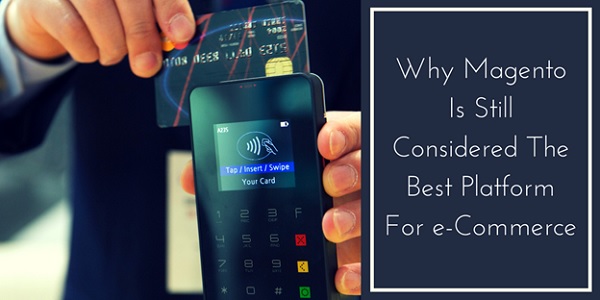From showcasing products to seamless online transactions, Magento offers almost everything to an e-commerce website.
However, unlike other content management systems like WordPress and Joomla, Magento does need a certain level of coding knowledge to build the site from scratch. At first glance, it may seem like a lot of effort, but it’s definitely worth it especially when you see the benefits coming with it. This post will throw more light on the matter.
Magento is made purely for e-commerce websites
Magento was made as a platform intended particularly for e-commerce websites, contrary to the likes of Drupal, Joomla, and WordPress which are primarily content management systems.
Some of the crucial e-commerce features of Magento include the following:
- Inventory management,
- User dashboards,
- Shipping and supplier management,
- Allowing bundling of products,
- CMS,
- Newsletters,
- Built-in cross sells and up sell abilities, and many more.
Apart from being friendly to e-commerce, the aforementioned features are also designed to ensure they are easy to use and convenient to work with.
Benefits of using Magento for e-commerce
- Easy and convenient integration
Although almost all CMS platforms come with core functionalities, not all solutions can be found within the system. More often than not they require other applications and plugins to smooth up their functionalities.
The Magento platform comes with the benefit of having a dedicated online shopping platform that can be conveniently integrated with ready-made apps and plugins from other developers.
Magento APIs can also be connected to various types of apps including the likes of shipping, analytics, tracking, payment gateway, and so on.
- Freedom of selecting any hosting service of your choice
If you require the convenience of a hosting, Magento Go offers you precisely that along with all the advantages coming with the Magento Community edition platform.
- The Magento Community edition won’t even cost you a dime
There are 3 versions of Magento:
- The Magento Community edition (can be used for free),
- Magento Enterprise (Paid),
- Magento Go (Paid service and is hosted on Magento servers).
The most popular of the three is the Magento Community Edition; one that is completely open-sourced with probably the largest and the most active e-commerce developer community on the internet.
Many service companies work with both the Enterprise and the Community edition depending on the requirements of the client. And the best thing about all that is the simple fact that the Community edition comes for free.
- Magento can be customized easily as per your requirements
E-commerce platforms come with different requirements. Something that’s working for a fashion retailer may not work well for power tools or hardware seller. And then there are other factors that ought to be taken into consideration as well such as:
- Customer service requirements,
- Size of the operation,
- Scale of the operation, etc.
Magento, being an open-source platform, is high customizable and modular. With the right coding expertise, Magento becomes similar to a wall putty in your hands.
- Lightning fast loading speed
More than 40% of users today expect a site to load within 2 seconds.
Any longer than that, they will close down the site and move on to something else. Now, this can leave behind a huge dent in your conversion rate.
With such a huge pressure to perform in comparison to that of your competitors, you would want to go for a platform that loads fast, allowing easy caching of pages, while allowing you to have as many whistles and bells you need for your e-commerce website.
Magento gives you precisely that in a whole new manner. It can process queries in a jiffy, retrieve data from humongous databases in milliseconds, and load pages with lightning-fast speed, thus pleasing your impatient customers.
- Magento is mobile-friendly
With the increasing number of smartphones, more and more people are using their phones to access websites in comparison to laptops and desktops.
Standing in 2018, I can easily say that it has never been more important for an online e-commerce platform to be mobile friendly because if it’s not, it’s going to lose the game.
The Magento platform comes packed with a complete mobile-friendly technology such that you can not only use the website to promote your products but can also give your customers the equivalent experience on their smartphones.
- Magento is SEO-friendly
We are more than aware of the fact by now that our websites need to be SEO-friendly to be ranked higher up the order.
Magento saves you the trouble of creating SEO-friendly URLs, meta descriptions, meta titles, URL rewrites, navigation, site maps, and category structures. Its source code comes with all of these built-in features, thus, saving you a whole lot of time and trouble in the long run.
Additional benefits worth our mentions include:
- An extremely well-organized website back end.
- A clean and beautiful shopping cart that’s easy to update when required.
- A beautifully designed default template.
- Add-on modules with new and significant capabilities.
- Seamlessly secured payment system.
Why is Magento better than other e-commerce platforms?
As far as e-commerce platforms are concerned, Magento has left almost everyone else behind. Here’s why:
- Easy-to-use features that can be used even by a layman without any prior programming knowledge.
- Automatic updates; this feature is quite unique and is not typically available in other e-commerce platforms.
- Versatile functions; visitors can browse easily, enjoy services, and buy conveniently.
- Multiple platform supportability.
- Multiple website support for promoting products and services across several domains.
- Scaling-up of an existing website.
Final word
Magento has so many features to offer that is has been justifiably considered the best pick by almost every e-commerce web designing company.
It was even recognized as the most popular e-commerce platform in the world in 2013. So what are you still waiting for? If you are looking to develop your very own e-commerce site, Magento should be the way for you to go. After all, its charges don’t bite.




